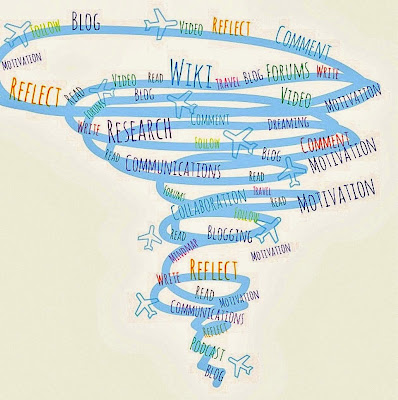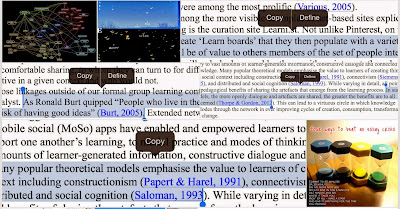
I wonder. Students separate their digital and student lives. I might see the potential and value of the smartphone as a 'university in your pocket' but this does not mean it is used in this way. Faced with a grand piano people are still going to play chopsticks. Mobile Learning I've covered in M.
Social Learning is the obvious one, though to some degree it applies to the above. The student's social life is distinct from their academic one. Though they will naturally learn a good deal from friends: life skills, such as how to buy and sell on Asos and stream movies you don't pay for  The OU had a bash at launching a Social Learning platform - and gave up a few months later (it was pants). We had or have by now a multitude of our platforms to share a collaborate with and from: Linkedin and Wordpress are the learning, sharing, collaborating, curating, platforms I used to discuss and write. Many would say Facebook.
The OU had a bash at launching a Social Learning platform - and gave up a few months later (it was pants). We had or have by now a multitude of our platforms to share a collaborate with and from: Linkedin and Wordpress are the learning, sharing, collaborating, curating, platforms I used to discuss and write. Many would say Facebook.
Is John Seely Brown and 'S' or a 'B'. An influential educator, not strictly 'e'.
George Siemens supposedly coined the term 'connectedness' that is the learning theory of the Web 2.0 age so I have dealt with him under 'c'. I wonder that if 'network theory' as it has become a science, is what is going on here though.
Rhona Sharpe and Gilly Salmon are authors in e-learning, with Gilly Salmon known for her terms 'e-tivities' and 'e-moderator'. I feel that when and where the 'e' is dropped as a prefix these interlopers will be first to go. Find me a GCSE or A' Level student who even differentiates the learning types by platform - it is all just learning, whether in class from a teacher, from a webpage or page in a book, whether they write their essay in longhand or in Google Docs.
Surface Learning - A surface approach to learning is where a learner is concerned to memorise the material for what it is, not trying to understand it in relation to previous ideas or other areas of understanding.
Second Life offers more than I have given expression too. It is an augmented, e-learning platform too.
Surveys are an interesting one. In 2001 or thereabouts the blogging platform 'Diaryland' (launched 1999) introduced surveys and the several thousand members, myself included, went crazy about them. We created a multitude of surveys then amassed responses and comments. I did one on interpreting your dreams. There were many on depression. And sex lives. Surveys are interesting because the internet allows you to get to so many people. Were surveys made for the Internet?
Is the semantic web getting anywhere?
Then there is 'spellchecker' - in this environment it is done for you. Where is the button? IT or LTS removed it some months ago. Are there other automated practices that 'teach' us in the background? My spelling has improved because after relentlessly having certain words corrected I no longer get them wrong in any context; occasionally comes to mind.
Then, come to think of it is SatNav.
Think about it. In the background. It takes you somewhere. You repeat the journey and after a few goes could (and should?) drive it SatNav free. You are shown the way. This is what teachers do. They show you the way, many times and ideally in a few different ways. They find ways around the obstacles, the traffic jams and road works. They help you get your vehicle to where it needs to be. So SatNav is both a learning platform, intuitive, in the background, solving a problem ... and a metaphor for e-learning?
REFERENCE
Lally, V, Magill E, (2011) Inter-Life: Learning in 3D Virtual Worlds (editorial – Guest Editors). In preparation for Journal of Computer Assisted Learning (Special Issue) pp5. FUNDED by EPSRC/ESRC RES-139-25-0402
Sclater, M. & Lally, V., 2009. Bringing Theory to Life: towards three-dimensional learning communities with ‘Inter-Life’. In G. Rijlaarsdam (ed.) Fostering Communities of Learners: 13th Biennial Conference for Research on Learning and Instruction (EARLI). Amsterdam: Graduate School of Teaching and Learning, University of Amsterdam, 190. Presentation available at http://www.inter-life.org/blog/?p=98
Lally, V. & Sclater, M., 2009. Inter-Life: where Second Life meets real life. Learning in Digital Worlds: CAL 2009. Brighton, UK: Elsevier. Presentation available at http://www.inter-life.org/blog/?p=83
Sclater, M. and Lally, V. (2013) Virtual Voices: Exploring Creative Practices to Support Life Skills Development among Young People Working in a Virtual World Community. International Journal of Art & Design Education 32 (3) 331–344. http://dx.doi.org/10.1111/j.1476-8070.2013.12024.x [OPEN ACCESS]
Salmon, G. (2002). E-tivities: the key to active only learning. Sterling, VA : Stylus Publishing Inc. ISSN 0 7494 3686 7
Salmon, G (2002) e-moderation
Seale, J. (2006) E-learning and Disability in Higher Education: Accessibility Research and Practice
Situative Learning - ‘Several decades of research support the view that it is the activity that the learner engages in, and the outcomes of that activity, that are significant for learning (e.g. Tergan 1997)
Sfard, A. (1998) ‘On two metaphors for learning and the dangers of choosing just one’, Educational Researcher, vol.27, no.2, pp.4–13; also available online at http://libezproxy.open.ac.uk/login?url=http://www.jstor.org/stable/1176193 (last accessed 10 December 2010)
Sharpe, R. Rethinking Pedagogy for a Digital Age.
Siemens, G. (2006). Connectivism: Learning theory or pastime of the self-amused.Retrieved February, 2, 2008.
Siemens, G. (2010). Teaching in social and technological networks. Connectivism: networked and social learning.
Siemens, G. (2009). Open isn’t so open anymore. Connectivism. Retrieved from http://www.connectivism.ca/?p=198













